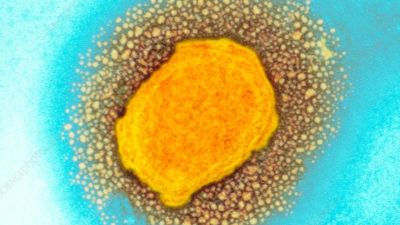First case of monkeypox confirmed in Wales

Rob Osborne with the latest on monkeypox in Wales.
The first case of monkeypox has been confirmed in Wales.
Public Health Wales has not said where in Wales the case is, but confirmed it is ready to respond to cases of the rare infection.
Cases have been reported across Europe, and in Canada and the US.
As of Wednesday, May 25, the UK Health Security Agency (UKHSA) had recorded a total of 78 cases in the UK, with 77 identified in England and one case reported in Scotland.
The latest guidance from the UK government says people at high risk of having caught the infection should self-isolate for 21 days.
Monkeypox | Need to know
What is monkeypox?
What is monkeypox?
Monkeypox is a rare infection. It's mainly spread by wild animals in parts of west or central Africa, which is what makes the recent cases elsewhere in the world unusual.
The risk of catching it in the UK is very low, however, the cases confirmed in the UK are not all one cluster - with separate cases springing up that are unconnected.
What are the symptoms?
What are the symptoms?
It usually takes between five and 21 days for the first symptoms of the infection to appear.
The first symptoms of monkeypox include:
a high temperature
a headache
muscle aches
backache
swollen glands
shivering (chills)
exhaustion
A rash, which often begins on the face before spreading, usually appears one to five days after the first symptoms.
How dangerous is monkeypox?
How dangerous is monkeypox?
Most people recover within a few weeks but severe illness can occur in some individuals.
Of the cases confirmed in the UK over the past month, at least three were treated in expert infectious disease units at hospital.
How does monkeypox spread?
How does monkeypox spread?
You can catch monkeypox from an infected animal if you're bitten or you touch its blood, body fluids, spots, blisters or scabs.
It may also be possible to catch monkeypox by eating meat from an infected animal that has not been cooked thoroughly, or by touching other products from infected animals (such as animal skin or fur).
It's very uncommon to get monkeypox from a person with the infection because it does not spread easily between people. But it can be spread through:
touching clothing, bedding or towels used by someone with the monkeypox rash
touching monkeypox skin blisters or scabs
the coughs or sneezes of a person with the monkeypox rash
That's why health authorities highlighted the sexuality of the latest four cases due to the spread of the virus through close contact.
The UK Health Security Agency said: "The most recent cases are in gay, bisexual and other men who have sex with men communities, and as the virus spreads through close contact, we are advising these groups to be alert to any unusual rashes or lesions on any part of their body, especially their genitalia, and to contact a sexual health service if they have concerns."
What should you do if you think you have monkeypox?
What should you do if you think you have monkeypox?
Monkeypox does not spread easily between people and the risk to the UK population is low, health authorities have stressed.
Anyone who thinks they could be infected with the virus is advised to contact clinics or GPs before visiting in person. These calls are always confidential.
Medical professionals have been warned to be alert to patients presenting with rashes without a clear alternative diagnosis and are advised to contact specialist services for advice.
People are advised to ask for an urgent GP appointment of call 111 only if they have symptoms of monkeypox and have recently returned from west or central Africa; or if they have been in contact with someone who has monkeypox.
Health authorities are contacting people who are close contacts of the very few confirmed cases. NHS guidance states: "If you have not been contacted, and you have not travelled to west or central Africa, it's extremely unlikely you have monkeypox."
Dr Giri Shankar, director of health protection for Public Health Wales, has confirmed that a case of monkeypox has been identified in Wales and what the symptoms are to look out for.
“We are working with the UK Health Security Agency (UKHSA), Public Health Scotland, and Public Health Agency Northern Ireland, and we are ready to respond to cases of monkeypox in Wales.
“The case is being managed appropriately. To protect patient confidentiality, no further details relating to the patient will be disclosed.
“We are reassuring people that monkeypox does not usually spread easily between people, and the overall risk to the general public is low. It is usually a mild self-limiting illness, and most people recover within a few weeks. However, severe illness can occur in some individuals.
“Initial symptoms of monkeypox include fever, headache, muscle aches, backache, swollen lymph nodes, chills and exhaustion. A rash can develop, often beginning on the face, then spreading to other parts of the body, particularly the hands and feet. The rash changes and goes through different stages before finally forming a scab, which later falls off.
“Everyone is being asked to be aware of the monkeypox symptoms, but it is important that gay and bisexual men are alert as it's believed to be spreading in sexual networks.
“Anyone with unusual rashes or lesions on any part of their body should contact NHS 111 or call a sexual health service if they have concerns.”